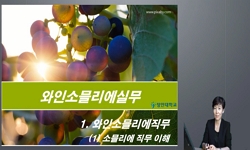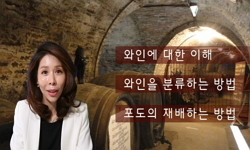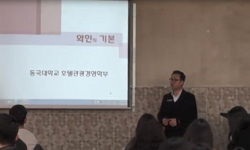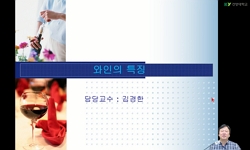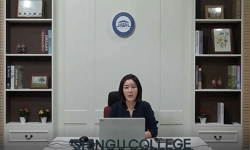국문초록 평생교육 교수자로서 와인교육 교수자의 역할에 관한 연구 평생교육·HRD 전공 엄미란 지 도 교 수 기영화 본 연구는 평생교육 프로그램 중의 하나인 와인교육에 있어�...
http://chineseinput.net/에서 pinyin(병음)방식으로 중국어를 변환할 수 있습니다.
변환된 중국어를 복사하여 사용하시면 됩니다.
- 中文 을 입력하시려면 zhongwen을 입력하시고 space를누르시면됩니다.
- 北京 을 입력하시려면 beijing을 입력하시고 space를 누르시면 됩니다.
평생교육 교수자로서 와인교육 교수자의 역할에 관한 연구 = A Study on Instructor's Roles in Education on Wine as a Lifelong Education Instructor
한글로보기https://www.riss.kr/link?id=T11922008
- 저자
-
발행사항
서울 : 숭실대학교 교육대학원, 2010
-
학위논문사항
학위논문(석사) -- 숭실대학교 교육대학원 , 평생교육·HRD , 2010. 2
-
발행연도
2010
-
작성언어
한국어
- 주제어
-
발행국(도시)
서울
-
형태사항
ix, 116 p. ; 26cm
- 소장기관
-
0
상세조회 -
0
다운로드
부가정보
국문 초록 (Abstract)
국문초록
평생교육 교수자로서 와인교육
교수자의 역할에 관한 연구
평생교육·HRD 전공 엄미란
지 도 교 수 기영화
본 연구는 평생교육 프로그램 중의 하나인 와인교육에 있어서 교수자의 역할에 대해 교수자 자신이 어떻게 인식하고 있으며, 또한 학습자와 와인교육기관의 경영자는 와인학습의 교수자의 역할에 어떻게 인식하고 있는가에 대하여 지속적 비교를 통한 질적연구방법으로 연구하였다.
본 연구의 대상자는 와인교육에 참여하여 와인을 강의하고 있는 교수자 7명과, 와인강의를 들었거나 현재 와인강의를 듣고 있는 학습자 4명, 그리고 현재 와인전문교육기관을 운영하고 있는 경영자 2 명이다. 면담을 통한 연구 자료의 수집은 2009년 6월부터 9월까지 약 4개월 동안 진행되었으며 질적연구방법으로 진행되었다. 63개의 개념과 그 개념에서 21개를 하의범주화 시켰고, 다시 7개의 범주를 도출하였다. 면담 내용은 녹취하여 자료수집과 동시에 지속적인 비교 분석을 실시하였다. 개념 도출과 배타적 범주화 작업에 동료 재검토(peer review)와 전문가의 지도로 자료 분석의 신뢰도를 높이고자하였다.
본 연구에서 인식된 와인교육 교수자의 역할은 크게 일곱 가지였다.
첫째, 교수자의 지속적인 연구자로서의 역할이다. 교수자의 풍부한 전문적 지식을 위한 지속적 학습과 와인문화에 대한 경험 및 와인 분야의 다양한 배경 그리고 유관분야에 대한 지식 등이 지속적 연구자로서의 역할로 인식되었다.
둘째, 교수자의 학습의 촉진자로서의 역할이다. 와인에 대한 오랜 경륜을 바탕으로 유연하게, 프로로서 학습자의 와인에 대한 수준과 목적에 따라 학습을 설계, 준비, 진행하고 재미있는 수업으로 학습을 촉진시키며, 실생활과 밀접한 실천적 지식을 제공하는 것이 와인교육 교수자의 역할로 인식되었다.
셋째, 문화의 제공자로서 교수자의 역할이다. 와인에 대한 정보와 국제적 트랜드를 파악하여 제공하고 교수자의 인문학적 경험과 지식을 바탕으로 와인의 내재된 가치나 역사·문화적 배경을 스토리텔링 하는 문화의 제공자로서의 교수자의 역할이 인식되었다.
넷째, 도제식 학습에서의 역할이다. 와인 테이스팅과 도구다루기의 숙달, 서비스훈련의 지속적 연습과 학습자로서 직접적 체험을 위한 견학과 실습 등의 기회를 갖도록 하는 것이 교수자의 역할로 인식되었다.
다섯째, 사회화의 매개자로서의 교수자의 역할이다. 교수자는 롤 모델과 동반자적 멘토로서의 역할을 하고, 학습자의 네트워킹 형성을 도와 와인에 대한 지속적 학습 기회를 제공하고, 특히 교수자와 경영자에게서만 인식된 마케팅마인드는 교수자와 경영자의 동반자적 신뢰의 중요성에 대한 인식과 와인 교수자의 역할의 범위를 일깨워 주었다.
여섯째, 이상적 역할 모델이다. 와인에 대한 자신감과 열정을 가진 직업적 소명의식과 기품을 지닌 교수자와 와인과의 조화된 이미지, 그 어떤 아우라 이다.
마지막으로, 문화의 중재·조정자로서의 와인 교수자 역할이다. 와인을 통한 문화의 다양성의 이해와 와인 그 자체가 지닌 훌륭한 철학·문화적 속성의 조화로움이 주는 행복감을 전하는 역할을 인식하게 되었다.
이상 와인 교수자의 역할에 대하여 인식된 것들로서 와인 교수자와 학습자, 경영자가 비교적 비슷하게 인식하고 있으며, 마케팅마인드에 관한 부분은 교수자와 경영자가 좀 더 머리를 맞대고 연구 할 수 있으며, 학습자는 교수자가 이상적 역할 모델이자 지속적이고 동반자적인 멘토가 되어주길 희망하고 있음이 나타났다.
와인 교수자들은 모여서 지속적 연구를 해 나갈 수 있는 방법을 체계적으로 모색해야하고, 학습자들에게 먼저 한 걸음 더 나아가고, 와인의 문화적·철학적 범주 안으로 학습자들을 끌어들이는 역할에 부지런하여야겠다.
다국어 초록 (Multilingual Abstract)
ABSTRACT A Study on Instructor's Roles in Education on Wine as a Lifelong Education Instructor Eum, Mi Ran Major in Lifelong Education·HRD Graduate School of Education Soongsil University The purpose of this study was to examine ...
ABSTRACT
A Study on Instructor's Roles in
Education on Wine
as a Lifelong Education Instructor
Eum, Mi Ran
Major in Lifelong Education·HRD
Graduate School of Education
Soongsil University
The purpose of this study was to examine the awareness of instructors of wine education, one of lifelong education programs, about their own roles as wine educators, and to compare their awareness to that of learners and managers of institutions providing wine education, which was one of qualitative research methods.
The subjects in this study were seven wine educators, four learners and two managers of institutions offering wine education. The learners had ever attended or were attending lectures on wine. Data were gathered by having an interview during an approximately four-month period of time from June to September, 2009, and a qualitative research method was adopted. Their awareness was categorized into 63, which were subcategorized into 21. Out of the 21 subcategories, seven were finally selected. The interviews were recorded and then transcribed, and a comparative analysis was repeatedly conducted whenever the data were gathered. The collected data were conceptualized and exclusively categorized through peer review and guidance from an expert to produce reliable results.
According to their awareness, there appeared largely seven different roles that wine educators should perform:
First, wine educators should continue to play the roles of researchers. The roles of researchers are to keep on learning to improve their professional knowledge, to gain experiences on the culture of wine, and to be knowledgeable about the history of wine and relevant fields.
Second, wine educators should perform the roles of learning facilitators. They should capitalize on their ample experiences to make an instructional design and be ready for lectures in light of the level of learners and the objects of each lecture. And they should offer intriguing instruction to expedite the learning of learners and provide them with their knowhow linked to daily life.
Third, wine educators should perform the roles of providers of culture. They should keep track of local and international trends in wine and give explanation on the intrinsic value of wine and its historical and cultural background based on their experiences and knowledge of humanities.
Fourth, wine educators should perform the role of stepping up apprentice-based learning. They should provide a hands-on opportunity for learners to be skilled at wine testing and tool handling, to undergo repeated service training and to take a field trip.
Fifth, wine educators should perform the roles of socialization agents. They should serve as strong role models and companion-like mentors and assist learners to set up a network with one another to ensure their prolonged learning. The necessity of marketing mindedness was only emphasized by the instructors and managers, which showed that the two groups kept in mind the importance of partnership and mutual trust between instructors and managers, and that the roles of wine educators were consequently enlarged.
Sixth, wine educators should become ideal role models. They should be confident, passionate and dignified instructors who have a sense of calling, and there should be something common between their image and that of wine, which could be called something like aura.
Finally, wine educators should perform the roles of cultural mediators and coordinators. They should help learners to enjoy happiness while they learn about the diversity of cultures through wine and about the superb, harmonious philosophical and cultural attributes of it.
Thus, the wine educators, learners and managers took a similar view of wine educator roles. As for marketing mindedness, it's advisable for the wine educators and managers to make concerted efforts to research it. The learners hoped wine educators to be ideal role models and companion-like mentors.
Finally, wine educators should join forces in making sustained research, and they should try to get closer to learners and let them enjoy the cultural and philosophical features of wine.
목차 (Table of Contents)
- 목 차
- 국문초록 ⅴ
- 영문초록 ⅶ
- 목 차
- 국문초록 ⅴ
- 영문초록 ⅶ
- 제 1 장 서 론 1
- 1.1 연구의 필요성 및 목적 1
- 1.2 연구 문제 4
- 1.3 용어 정의 4
- 제 2 장 문헌 고찰 6
- 2.1 평생교육 교수자의 개념 6
- 2.2 평생교육 교수자의 역할과 학습유형 7
- 2.2.1 평생교육 교수자의 역할 7
- 2.2.2 학습유형에 따른 교수자의 역할 10
- 2.3 평생교육 교수방법 19
- 2.3.1 교수 방법의 선정 및 준비 19
- 2.3.2 교수실행 및 평가 24
- 2.4 국내 와인교육과 와인문화의 확산 28
- 2.4.1 와인의 역사 28
- 2.4.2 와인교육의 현황 29
- 2.4.3 와인문화의 확산 32
- 제 3 장 연구방법과 연구절차 35
- 3.1 연구 방법 35
- 3.2 연구절차 35
- 3.3 연구 참여자 선정 37
- 3.4 자료 수집 방법 38
- 3.5 자료 분석 방법 39
- 제 4 장 연구 결과 41
- 4.1 연구 참여자의 일반적 특성 41
- 4.2 연구 결과 분석 46
- 4.2.1 지속적인 연구자 역할 49
- 4.2.2 학습의 촉진자 역할 56
- 4.2.3 문화의 제공자 역할 71
- 4.2.4 도제식 학습 78
- 4.2.5 사회화의 매개자 85
- 4.2.7 문화의 중재·조정자 101
- 제 5 장 요약, 결론 및 제언 107
- 5.1 요약 107
- 5.2 결론 108
- 5.3 제언 112
- 참고 문헌 113
- 표 목 차
- <표 2-1> Grow의학습자의 자기주도성 단계에 따른 교수자의 역할 8
- <표 2-2> 학습유형과 교수자의 역할 11
- <표 2-3> 그라샤(Grash)의 교수자의 수업스타일의 4가지 분류 21
- <표 2-4> A 와인교육기관의 교육과정 30
- <표 2-5> B 와인교육기관의 교육과정 31
- <표 2-6> C 와인교육기관의 교육과정 31
- <표 2-7> 한국 2007~2009 상반기 포도주 수입 통계 34
- <표 4-1> 연구 참여자의 일반적 특성 42
- <표 4-2> 와인교육 교수자의 역할에 대한 범주화 47
- 그 림 목 차
- [그림 2-1] 성인교육자의 개념 분류 모형 7
- [그림 2-2] 성인학습의 3가지 유형에 따른 교수자의 역할변화 관계 10
- [그림 2-3] 쉐논과 쉬람의 의사소통 모형 26
- [그림 4-1] 와인 교수자의 역할 모형 49






